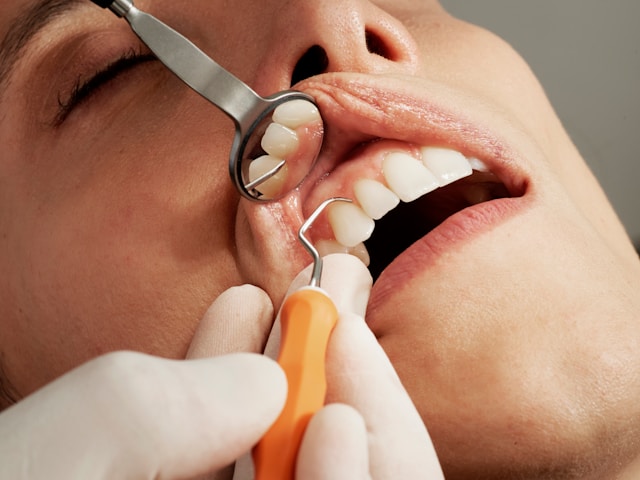Understanding when a tooth abscess escalates into a dental emergency is vital for preserving oral health and preventing severe systemic complications. While an abscess may seem minor initially, certain symptoms, such as intense pain, facial swelling, fever, or a sudden foul discharge, signal a potentially serious situation. This discussion aims to explore these alarming signs and the subsequent necessary steps to take, thereby emphasizing the importance of immediate dental intervention in such scenarios. The implications of delaying treatment, as well as preventive measures, will further underline the gravity of this subject.
Understanding a Tooth Abscess
An alarming number of individuals worldwide are often oblivious to the severity of a dental condition known as a tooth abscess. This condition represents a critical concern in oral healthcare due to its potential to precipitate serious complications if left untreated. The understanding of tooth anatomy is crucial in comprehending the pathogenesis of a tooth abscess. In essence, an abscess is a pocket of pus that forms due to a bacterial infection in different parts of the tooth.
The various abscess types are primarily classified based on their location in relation to tooth anatomy. The periapical abscess originates from the dental pulp, the innermost part of the tooth where the nerve and blood vessels reside. Alternatively, a periodontal abscess is associated with the gums and the bone structure that supports the teeth, while a gingival abscess is solely confined to the gum tissue. Each abscess type presents unique challenges and requires specific therapeutic approaches.
The gravity of a tooth abscess should not be underestimated. The symptoms can rapidly escalate, transforming a seemingly innocuous dental issue into a potentially life-threatening scenario. Thus, a precise understanding of a tooth abscess is paramount in preventing further health complications.
Common Causes of Abscesses
In the quest to prevent a tooth abscess, one must be acquainted with its common causes. The primary culprit behind a tooth abscess is a bacterial infection, often a direct result of tooth decay, gum disease, or a cracked tooth.
When a tooth undergoes decay or gets cracked, bacteria gain an entry point into the tooth’s pulp, which is a combination of blood vessels and nerves. This intrusion leads to infection, inflammation, and subsequently, an abscess. A compromised immune system can also leave an individual more susceptible to infections, thereby increasing the likelihood of developing an abscess.
Gum disease, also known as periodontal disease, is another common cause. This condition involves severe inflammation of the gums, often leading to pockets or gaps between the teeth and gums. These pockets can harbor bacteria, paving the way for an abscess if left untreated.
In essence, maintaining good oral hygiene and promptly addressing dental issues such as cavities and gum disease can greatly reduce the risk of a tooth abscess. Regular dental check-ups are also essential in early detection and treatment of potential threats to oral health.
Recognizing Abscess Symptoms
Spotting the signs of a tooth abscess early can be essential in preventing more severe complications. The most common symptom is a persistent, severe toothache that can radiate to the jaw, neck, or ear. Sensitivity to hot and cold temperatures, swelling in the face or cheek, lymph nodes under your jaw or in your neck swelling, and a rush of foul-tasting, salty fluid in your mouth followed by pain relief if the abscess ruptures, are other tell-tale signs.
Pain management is an important part of dealing with a tooth abscess. Over-the-counter pain relievers may provide temporary relief. However, they are not a substitute for dental treatment. Home remedies such as rinsing your mouth with a mild saltwater solution can also help in alleviating discomfort.
In some cases, symptoms may not be immediately apparent, making regular dental check-ups essential. If left untreated, a dental abscess can lead to more serious issues. It’s important to consult with a dental professional if you experience any of these symptoms. Early recognition and treatment of a tooth abscess can prevent it from becoming a dental emergency.
Complications of Untreated Abscesses
Ignoring a tooth abscess can lead to severe complications that extend beyond your oral health. The persistent infection can spread from the tooth to surrounding tissues and bones, leading to significant facial swelling. This could distort your features and cause severe discomfort.
Moreover, untreated abscesses can also lead to systemic infections, which can pose life-threatening risks. The harmful bacteria can travel through your bloodstream and affect other organs in your body, including your heart and lungs.
In a more detailed view, below are three major complications of untreated tooth abscesses that could gravely impact your overall health:
- Facial Cellulitis: This is a fast-spreading bacterial skin infection that can cause dramatic swelling and redness of the face. It requires immediate medical attention to prevent further complications.
- Sepsis: This is a serious infection that spreads throughout your body. It is a medical emergency and can lead to organ failure or death if not treated promptly.
- Ludwig’s Angina: This is a type of severe cellulitis that affects the floor of the mouth, often causing difficulty in breathing and swallowing.
This underscores the importance of seeking immediate dental care when experiencing symptoms of a tooth abscess.
When to Consider It an Emergency
Given the serious complications associated with an untreated tooth abscess, it becomes essential to recognize when such a dental issue escalates to an emergency. A situation is considered to be of dental urgency when the patient experiences severe, unbearable pain that is not remedied by over-the-counter pain relievers. The pain may be accompanied by fever, swelling, and difficulty in opening the mouth or swallowing, indicating a spread of the infection, which could potentially be life-threatening if not treated promptly. In these cases, seeking emergency dental treatment for abscess-related infections can be critical to preventing further health risks and ensuring timely care.
In some cases, a tooth abscess may rupture, causing a sudden rush of foul-smelling and foul-tasting discharge in the mouth. This may momentarily relieve pain, but it does not mean the condition has resolved. In fact, it signals an urgent need for professional dental care to prevent the infection from spreading further.
Effective pain management plays a vital role in handling such situations. However, it is only a temporary solution and should not replace immediate dental help. Understanding these signs and acting quickly can reduce the risk of serious complications, making it essential to be aware of when a tooth abscess becomes a dental emergency.

Seeking Immediate Dental Care
The importance of promptly identifying the symptoms of a tooth abscess cannot be overstated, as early detection is critical to preventing worsening conditions. Immediate dental care plays a significant role in managing this dental emergency and mitigating potential health complications. This discussion will focus on recognizing abscess symptoms and the urgency of seeking professional dental treatment.
Recognizing Abscess Symptoms
A significant number of individuals often dismiss the early signs of a tooth abscess, an oversight that can exacerbate the condition. Recognizing abscess symptoms can enable timely intervention and prevent the progression of the infection.
Symptom identification involves understanding the common manifestations of a dental abscess. These include:
- Severe, persistent, throbbing toothache.
- Sensitivity to hot and cold temperatures.
- Swelling in the face or cheek.
Pain assessment, on the other hand, is a vital aspect to take into account. The nature of pain associated with a tooth abscess is not ordinary. It is typically severe, with a pulsating quality, and may radiate to the ear, jawbone, or neck.
Understanding these symptoms is essential, as a delayed response could lead to the spread of infection. It is important to seek professional dental care when these symptoms are present. By acknowledging the severity of these symptoms, individuals can take the necessary steps towards their health and well-being, preventing further complications or damage.
Importance of Urgent Treatment
Prompt intervention becomes a critical factor when dealing with a dental abscess. It is essential to understand that this condition presents significant dental risks, which can greatly exacerbate if not treated urgently. The importance of urgent treatment cannot be overstated.
A dental abscess is an infection that could potentially spread to other parts of the body if not treated promptly, leading to severe health issues. Urgent care, in this situation, entails immediate professional dental attention to drain the abscess and eliminate the infection, minimizing the risk of further complications.
Ignoring or delaying treatment can lead to the infection spreading to other areas such as the jaw, neck, or even the brain. It could also result in sepsis, which is a life-threatening condition. Urgent care for a dental abscess also mitigates the risk of tooth loss, which can happen if the tooth or surrounding tissues sustain substantial damage from the abscess.
Preventive Measures for Tooth Abscesses
Guarding against tooth abscesses, a painful and potentially dangerous condition, involves a combination of good oral hygiene practices and regular dental check-ups. These preventive measures are essential to maintain oral health and avoid complications associated with tooth abscesses.
Incorporating a robust oral hygiene routine is key. This includes regular brushing and flossing to remove plaque, the sticky film on teeth that contributes to abscesses. It’s also important to replace your toothbrush every three to four months or sooner if the bristles become frayed.
Dietary habits also play a notable role in tooth abscess prevention. Consuming a balanced diet and limiting intake of sugary foods and drinks can greatly reduce the risk of tooth decay and abscess formation. Remember, bacteria in the mouth thrive on sugars and produce acids that can cause cavities.
Regular dental check-ups are another vital preventive measure. Dentists can detect early signs of dental issues that may lead to abscesses.
- Maintain good oral hygiene: Brush and floss regularly.
- Monitor dietary habits: Limit sugary foods and drinks.
- Regular dental check-ups: Early detection can prevent abscesses.
Through these measures, you can effectively guard against tooth abscesses and maintain a healthy smile.
Frequently Asked Questions
Can a Tooth Abscess Cause Other Health Issues?
Yes, a tooth abscess can cause other health issues. Untreated abscesses can lead to tooth sensitivity and potentially spread infection to other parts of the body, underlining the importance of prompt dental treatment.
What Are the Treatment Options for a Tooth Abscess?
Treatment options for a tooth abscess include antibiotics, pain management strategies, and often, a root canal procedure. In severe cases, extraction may be necessary. Consultation with a dental professional is critical for appropriate treatment.
Is a Tooth Abscess Contagious?
A tooth abscess is not typically contagious under normal circumstances. However, maintaining good tooth hygiene and regular dental care can help prevent the development of abscesses and other dental health complications.
Could Certain Diets Prevent Tooth Abscesses?
Preventive nutrition plays an essential role in oral health. Dietary habits like limiting sugar intake and consuming a balanced diet rich in vitamins and minerals can greatly reduce the risk of developing tooth abscesses.
Can Tooth Abscesses Reoccur After Treatment?
Yes, tooth abscesses can reoccur after treatment. The recurrence factors include poor oral hygiene and a weakened immune system. Prevention strategies involve regular dental check-ups and maintaining good oral hygiene practices.
